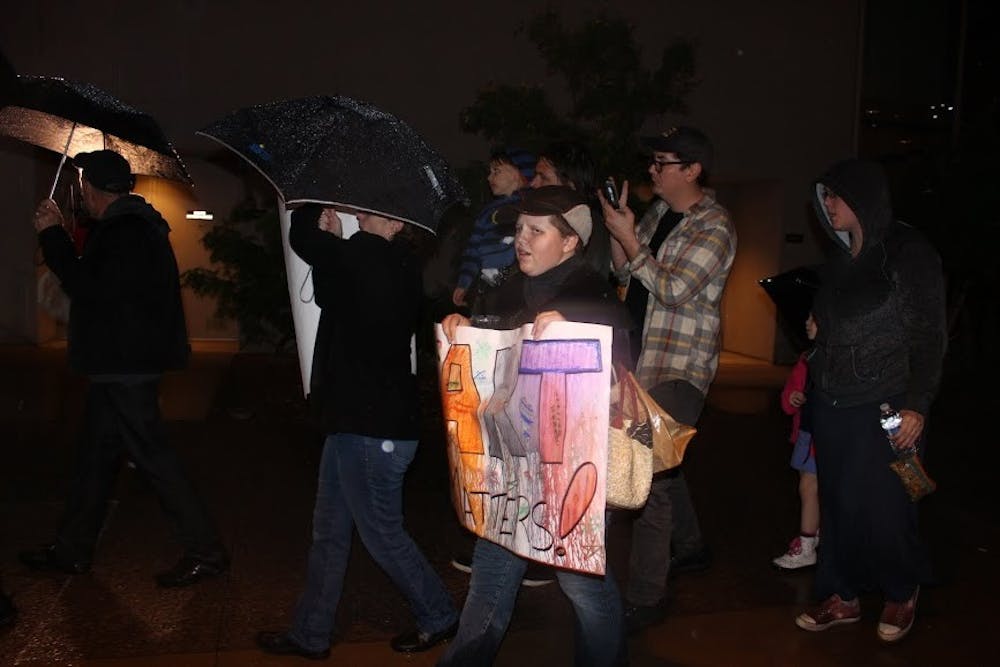 Hans Keller is pictured in front of the "Today I Will Make" mural on ASU's Polytechnic campus. Keller lives with autism and says that ASD@ASU is a great resource for students who are living with autism. (Photo by Dominic Valente)
Hans Keller is pictured in front of the "Today I Will Make" mural on ASU's Polytechnic campus. Keller lives with autism and says that ASD@ASU is a great resource for students who are living with autism. (Photo by Dominic Valente)
Hans Keller, who was diagnosed with autism at age 14, said the condition gave him something to focus on overcoming rather than remaining angry and frustrated with the difficulties he had been experiencing with communication.
As founder of the club ASD@ASU for students with autism, Keller said his freshman year of college was the first time he had lived away from home, and it took him a while to adapt.
Keller, a technological entrepreneurship and management senior, withdrew from two of his classes and dropped another halfway into his first semester, finishing with only six of his original 15 credits, he said.
Keller said one of his suitemates during his freshman year would often steal things from him. The suitemate was removed after Keller reported the problem to a dean.
“It kind of opens your eyes to that college is a completely different animal,” Keller said.
Until he approached the dean, Keller said he not asked enough of the people in charge and much of it had to do with communication issues. He said autism is a communication barrier that causes a lot of misconceptions between those who have it and those who do not.
He said the idea to found the club ASD@ASU was not his but Garret Westlake’s, the director of the Disability Resource Center at the Polytechnic campus.
Keller was chosen to help found the club when Westlake saw the progress Keller made in overcoming difficulties his freshman year, Keller said.
“I just needed a push in the right direction,” he said.
Before leading ASD@ASU, Keller said he had no experience running a club.
“(It's) still a little bit hard to think about doing,” he said.
His time as club leader served as a way to connect with other like-minded organizations, Keller said.
He said his plans for after college are to start up a computer service and do on-site computer repairs. He added he will continue participating in speaking engagements for people on all parts of the autistic spectrum.
Westlake said he met Keller when he registered with the Disability Resource Center as a freshman.
“He struck me as very outgoing, personable and friendly,” he said.
Westlake said the idea for ASD@ASU came from a class he taught for students on the autistic spectrum. When the class ended, students approached him and asked what other opportunities existed to remain in touch with each other, and he suggested starting a student organization, he said.
Westlake said he chose Keller to lead the club because of how easily he connected with other people. Keller has since become more confident, better at communication and a campus leader, he said.
“Hans has been a great advocate on the ASU campus as well as in the community,” Westlake said.
He said his only other role in the club’s creation was informing Keller of what the procedures to start a club were.
He and Keller meet approximately twice a month to talk about anything Keller is working on for the club, he said.
He said Keller will be successful at whatever he decides to do with his life, no matter what it is.
“I think Hans is an extremely capable individual,” he said.
Marlene Keller, Hans Keller’s mother, said it was relief when he was diagnosed because they now had an explanation for what had been ailing him. It meant his difficulties with making friends and developing relationships were not a behavioral problem, she said.
“We could identify and explain some of his issues,” she said.
Marlene said if they had recognized Keller’s symptoms sooner, she and his father might have been able to provide more support rather than tell themselves, “Maybe he’ll outgrow it.”
He only looked at things from his perspective, she said. Keller once told his mother “You better tell me you’re sorry,” after a scolding received when he was 4 years old, unable to see what he had done wrong, Marlene said.
“To him, he was always right,” she said.
As a child, Keller was bullied frequently because he alienated the other children by missing social cues, Marlene said. He got along better with adults, because they were more patient and understanding, she said.
Marlene said her son now recognizes he has trouble understanding others and has worked to overcome it. They have developed an eye signal when she needs to let him know to be more aware of the people around him, she said.
The club has let Keller realize he is not alone and that there are people he can relate to, Marlene said. She added he has cultivated a passion to reach out to and help people like him on the spectrum.
“He has come a very long way,” she said.
Reach the reporter at smande17@asu.edu or follow @SarahDeAnderson




